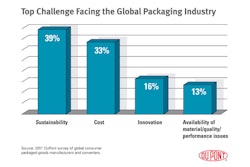
The majority of businesses say that the benefits resulting from their sustainability initiatives have exceeded expectations, according to an international survey by Accenture. But a hard-core minority of businesses does not see sustainability as a critical or strategic investment.
The survey of 247 C-suite decision makers in the U.S., U.K., and China reveals that 72% think the benefits of their sustainability initiatives exceeded expectations. Only 4% failed to meet expectations. Business leaders identify the main benefits as: reputation and trust (cited by 49% of respondents), lower costs (42%), and an improved brand (41%).
Although two thirds (68%) of senior business decision makers see sustainability as an integrated part of their business, a hard core of 32% says it is peripheral. While 66% see sustainability as an investment, 34% see it as more of a cost. And although 60% believe their company is investing the right level in sustainability initiatives, 28% say their business invests too much or far too much. The same proportion states that businesses in general are doing too much to make their working practices more sustainable.
Ninety-three percent of respondents say their company currently has sustainability initiatives. The most common focus areas are: reducing the amount of electricity used and green IT (both cited by 51%), followed by sustainability talent and skills initiatives (47%), and the development of sustainability-based new products and services (44%).
"The good news is that companies are already seeing sustainability investments generate returns in terms of market success and cost performance," says Bruno Berthon, managing director, Accenture Sustainability Services. "The irony is that the hardcore third of businesses who don’t enjoy these benefits are likely the ones who think sustainability is peripheral to their business. Only by placing it at the heart of commercial strategy can sustainability be a channel to growth and innovation."
Drivers and barriers
There is a disparity between assumed and actual drivers of sustainability initiatives. Companies expect that business in general will be driven by three key external factors: investment pressure, regulations, and customer expectations. In reality, however, the top motivations are a genuine concern for the environment and society (cited by 53%) and reducing energy and material costs (50%). Also important are customer expectations (47%) and an opportunity for higher margins and business growth (45%).
Cost is the most significant barrier to sustainability initiatives, with 43% of respondents identifying it. Other key barriers include the inability to measure sustainability initiatives (31%), the lack of government/local government incentives (30%), and the belief that one company can't make a difference to global warming (29%).
"It's clear that sustainability is no longer merely a matter of compliance, but a proactive way to energize commercial strategy," says Berthon. "Measuring sustainability performance and results is the first practical step business leaders need to make, but requires new skills and proven methodologies. Get it right, and sustainability champions can form a business case, galvanize internal support, and actively secure shareholder support."
The role of government, financial sector
When asked who should be more responsible for ensuring progress is made in a sustainable way, 41% say businesses should, versus 36% who think government should be more responsible and 23% who identify individuals. Almost half (47%) of respondents think that business is doing the most to promote sustainable progress, against only 28% who think governments are and 26% who identify individuals.
Although many business leaders may want more government incentives to encourage them to act, they are satisfied with the support from the financial sector. Forty-five percent say that the financial sector is, itself, investing the right amount in sustainability initiatives, although 28% say it invests too little, and 26% too much. Meanwhile, 75% of C-suite decision makers have confidence in the financial sector to provide funding for sustainability initiatives.
The survey was undertaken in advance of Sustainability 24, where a live virtual 12-hr global broadcast brought together businesses and local government leaders from around the world online to demonstrate best practice in sustainability.
























